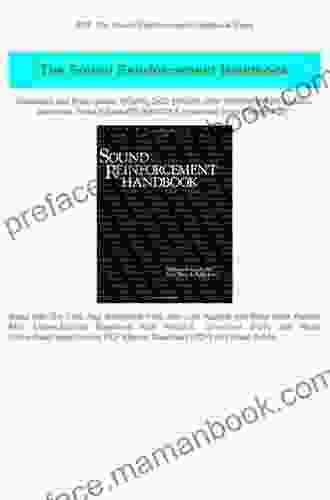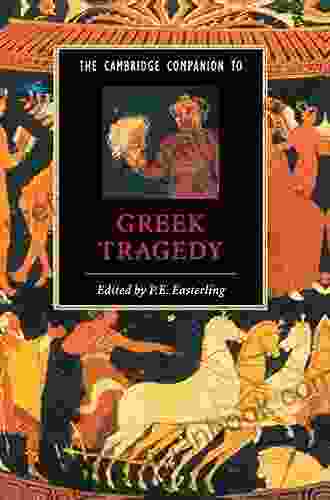The Cambridge Companion to Greek Tragedy: A Comprehensive Guide to Ancient Greek Drama

Welcome to the fascinating world of ancient Greek tragedy, a literary genre that has captivated audiences for centuries with its timeless themes, powerful characters, and profound insights into the human condition. In this comprehensive guide, "The Cambridge Companion to Greek Tragedy," we embark on a journey to uncover the origins, evolution, and enduring impact of this influential literary form.
4.5 out of 5
| Language | : | English |
| File size | : | 6248 KB |
| Text-to-Speech | : | Enabled |
| Screen Reader | : | Supported |
| Enhanced typesetting | : | Enabled |
| Word Wise | : | Enabled |
| Print length | : | 410 pages |
Chapter 1: The Origins of Greek Tragedy
Our exploration begins by tracing the roots of Greek tragedy back to the ancient religious rituals and festivals that honored the god Dionysus. We delve into the origins of the chorus, the central element of Greek tragedy, and examine the role of music and dance in these early performances.
Key Themes and Motifs
- The relationship between humans and the gods
- The power of fate and destiny
- The themes of hubris and nemesis
- The search for justice and morality
Chapter 2: The Three Great Tragedians
Next, we encounter the three towering figures of Greek tragedy: Aeschylus, Sophocles, and Euripides. We explore their unique styles, thematic preoccupations, and contributions to the development of the genre.
Aeschylus: The Father of Tragedy
Aeschylus is widely regarded as the father of Greek tragedy, credited with introducing the second actor and expanding the role of the chorus. His works, such as "The Oresteia" and "Prometheus Bound," grapple with profound questions about divine justice, human suffering, and the nature of the gods.
Sophocles: The Master of Plot and Character
Sophocles is renowned for his flawless dramatic structure and unforgettable characters. His plays, including "Oedipus Rex" and "Antigone," explore the complexities of human nature, the clash between personal desires and societal norms, and the search for justice.
Euripides: The Innovator and Humanist
Euripides was a bold innovator who challenged traditional conventions and introduced a more humanistic perspective to tragedy. His plays, such as "Medea" and "The Bacchae," focus on the inner struggles of individuals, the power of passion, and the irrationality of human behavior.
Chapter 3: Aristotle's Poetics and the Theory of Tragedy
In this chapter, we delve into Aristotle's seminal work on literary theory, "Poetics." Aristotle's analysis of tragedy provides a framework for understanding the essential elements of the genre, including plot, character, thought, diction, spectacle, and music.
Key Concepts
- Catharsis: The emotional purification experienced by the audience
- Hamartia: The tragic flaw or error of judgment that leads to the protagonist's downfall
- Hubris: Excessive pride or arrogance that incurs divine punishment
- Nemesis: The retribution or divine justice that follows hubris
Chapter 4: Greek Theater and Performance
To fully appreciate Greek tragedy, we must also consider the context of its performance. This chapter explores the physical structure of the Greek theater, the role of the audience, and the techniques employed by actors and chorus members to convey the power and emotion of the plays.
Key Features of Greek Theater
- Open-air amphitheaters with excellent acoustics
- Raised stage with a backdrop of painted scenery
- Use of masks, costumes, and elaborate props
- Audience participation through reactions and commentary
Chapter 5: The Legacy of Greek Tragedy
Greek tragedy has left an enduring legacy that continues to shape literature, theater, and culture to this day. We trace the influence of Greek tragedy on later playwrights, philosophers, and artists, and examine its impact on Western civilization.
Key Influences
- The development of Western drama and theater
- The shaping of philosophical ideas about the human condition
- The emergence of themes and motifs in art, literature, and music
Through "The Cambridge Companion to Greek Tragedy," we have embarked on an in-depth exploration of this captivating literary genre, uncovering its origins, evolution, and enduring impact. From the religious rituals that gave birth to tragedy to the profound insights of Aeschylus, Sophocles, and Euripides, to the enduring legacy that continues to inspire artists and thinkers today, Greek tragedy remains a testament to the power of storytelling and the enduring human quest for meaning and understanding.
We encourage you to delve deeper into the world of Greek tragedy, immerse yourself in the works of these master playwrights, and discover the timeless truths and profound insights that continue to resonate with audiences centuries later.
Additional Resources
- The Cambridge Companion to Greek Tragedy on Cambridge Core
- The Cambridge Companion to Greek Tragedy on Amazon
- The Cambridge Companion to Greek Tragedy on JSTOR
4.5 out of 5
| Language | : | English |
| File size | : | 6248 KB |
| Text-to-Speech | : | Enabled |
| Screen Reader | : | Supported |
| Enhanced typesetting | : | Enabled |
| Word Wise | : | Enabled |
| Print length | : | 410 pages |
Do you want to contribute by writing guest posts on this blog?
Please contact us and send us a resume of previous articles that you have written.
 Top Book
Top Book Novel
Novel Fiction
Fiction Nonfiction
Nonfiction Literature
Literature Paperback
Paperback Hardcover
Hardcover E-book
E-book Audiobook
Audiobook Bestseller
Bestseller Classic
Classic Mystery
Mystery Thriller
Thriller Romance
Romance Fantasy
Fantasy Science Fiction
Science Fiction Biography
Biography Memoir
Memoir Autobiography
Autobiography Poetry
Poetry Drama
Drama Historical Fiction
Historical Fiction Self-help
Self-help Young Adult
Young Adult Childrens Books
Childrens Books Graphic Novel
Graphic Novel Anthology
Anthology Series
Series Encyclopedia
Encyclopedia Reference
Reference Guidebook
Guidebook Textbook
Textbook Workbook
Workbook Journal
Journal Diary
Diary Manuscript
Manuscript Folio
Folio Pulp Fiction
Pulp Fiction Short Stories
Short Stories Fairy Tales
Fairy Tales Fables
Fables Mythology
Mythology Philosophy
Philosophy Religion
Religion Spirituality
Spirituality Essays
Essays Critique
Critique Commentary
Commentary Glossary
Glossary Bibliography
Bibliography Index
Index Table of Contents
Table of Contents Preface
Preface Introduction
Introduction Foreword
Foreword Afterword
Afterword Appendices
Appendices Annotations
Annotations Footnotes
Footnotes Epilogue
Epilogue Prologue
Prologue Stephen Galloway
Stephen Galloway Kody Boye
Kody Boye David Baker
David Baker Hayley Summers
Hayley Summers Jon Sinden
Jon Sinden Bernardo P Gallegos
Bernardo P Gallegos Agatha Christie
Agatha Christie Eric Toussaint
Eric Toussaint Clint Smith
Clint Smith Harloe Rae
Harloe Rae Allie Boniface
Allie Boniface Charles Fuhrken
Charles Fuhrken Gary John Bishop
Gary John Bishop George A Akerlof
George A Akerlof Jenn Davis
Jenn Davis William Blake
William Blake Ellis Avery
Ellis Avery Ron Avi Astor
Ron Avi Astor Marie Elizibeth Parks
Marie Elizibeth Parks Michelle Borel
Michelle Borel
Light bulbAdvertise smarter! Our strategic ad space ensures maximum exposure. Reserve your spot today!

 Curtis StewartUnveiling the Hidden Gems of Snapchat: Unlock Secret Features to Boost Your...
Curtis StewartUnveiling the Hidden Gems of Snapchat: Unlock Secret Features to Boost Your... Joel MitchellFollow ·7.3k
Joel MitchellFollow ·7.3k Dwayne MitchellFollow ·18.3k
Dwayne MitchellFollow ·18.3k Ethan GrayFollow ·4.6k
Ethan GrayFollow ·4.6k J.D. SalingerFollow ·13.9k
J.D. SalingerFollow ·13.9k Patrick RothfussFollow ·2.7k
Patrick RothfussFollow ·2.7k Alex ReedFollow ·8.7k
Alex ReedFollow ·8.7k Andy ColeFollow ·2.6k
Andy ColeFollow ·2.6k Edward ReedFollow ·15.2k
Edward ReedFollow ·15.2k

 Vincent Mitchell
Vincent MitchellUnveiling the Enchanting Tale of Plant Reproduction: A...
Plants, the silent yet vibrant...

 Sam Carter
Sam CarterDelve into the Enigmatic World of "Relative Murder: A...
In the realm of mystery and suspense, the...

 Richard Simmons
Richard SimmonsThe Sound Reinforcement Handbook: A Comprehensive Guide...
In the realm of live sound engineering, The...

 Leo Tolstoy
Leo TolstoyEnter the New Era of Cyberwar: Unmasking the Kremlin's...
`` Prologue: The Digital...

 Brenton Cox
Brenton CoxFirst Lessons Ukulele Bridget Baker: A Comprehensive...
Embarking on a musical journey with the...
4.5 out of 5
| Language | : | English |
| File size | : | 6248 KB |
| Text-to-Speech | : | Enabled |
| Screen Reader | : | Supported |
| Enhanced typesetting | : | Enabled |
| Word Wise | : | Enabled |
| Print length | : | 410 pages |












